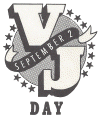Learning about V-J Day (Victory over Japan Day) provides your K-12 students with a deeper understanding of 20th-century world history, the consequences of global conflict, and the complex nature of victory and remembrance. It marks the end of World War II following Japan's surrender on August 15, 1945, offering a pivotal moment to discuss the war's immense human cost, the ethical implications of atomic warfare, and the dawn of the nuclear age. This study encourages critical thinking about how nations memorialize triumph and tragedy, and the lasting geopolitical shifts that shaped the modern world, including the onset of the Cold War and the reconstruction of post-war societies.
For your older students, V-J Day can serve as a case study for analyzing primary sources—such as speeches, photographs, and personal accounts—to understand diverse perspectives, including celebratory homefront reactions alongside the somber reflections of veterans and affected civilians. It also opens discussions on the Pacific Theater's often underrepresented history, fostering a more inclusive grasp of the war's global impact. These lessons not only build historical literacy but also cultivate empathy, ethical reasoning, and an appreciation for peace and diplomacy in international relations.
|

















































